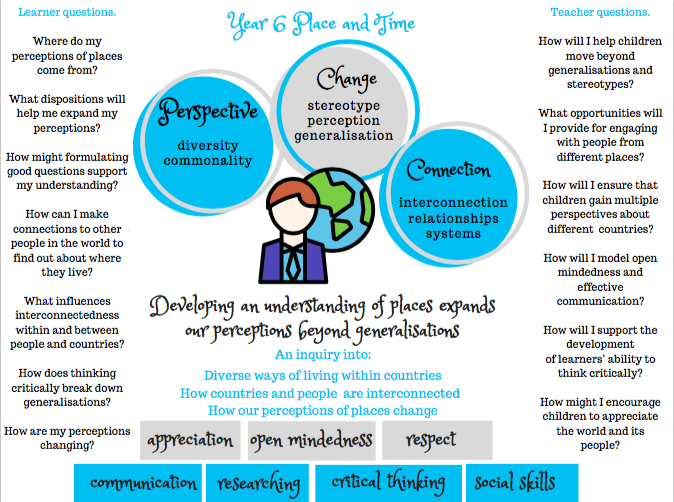
Within the context of our current unit of inquiry, assessment tells me that my learners need to develop their questioning skills. It occurs to me that asking questions of people from countries and cultures other than my own is a complex, sensitive thing to do. The art and skill of effective interviewing is one that we need to learn about.
When considering this central idea, questioning people from other countries about where and how they live needs careful planning. If we intend to develop our perceptions beyond generalisations, it’s important that our questions are open and inquiring rather than reflecting our own generalisations.
It also seems clangingly obvious, but I suspect the writing we need to be doing in class is writing interview questions. Each question, a finely tuned mini-text; with a beginning, a middle and an end. So…what’s the best mentor text to use? Who is the best author of questions? In my opinion, Andrew Denton, an Australian television presenter, has almost perfected the art of the interview. So we began by watching the first part of his interview with Jerry Seinfeld.
As inquiring writers, we are now used to noticing and naming author techniques. The learners noted the following in Denton’s interviewing:
- a series of ‘light’ questions at the beginning to warm up Seinfeld and create a sense of comfort
- non-questions (gestures, laughs, encouragement, agreement)
- lead in statements which reveal Denton’s research and prior knowledge about his subject (“It’s been said that…”, “You’re known for…”)
- open-ended questioning
It was clear that questions were not all deep and probing. At various points in the interview, questions were asked to match the comfort level of the subject. It occurred to me in that moment that a revisit of the iceberg model might be useful here. 
What sort of surface level questions can be asked that encourage comfort and a sense of safety? Where do they belong in the interview? What sort of deeper, probing questions require more reflection and thought from the subject? How many of these are needed? How many are too many? How do I ask a difficult question without offending my subject? They needed a test audience for their questions. Someone who was unlikely to be offended. Someone who will give honest feedback. Someone they know enough about to base their questions on prior knowledge…me.
After collaborating in pairs and small groups, a range of questions was asked; each group taking a turn to ask a series of questions they felt built on each other. I answered each question as naturally as possible. Examples of their questions included:
- We know you’re doing an inquiry into learner agency. Who are your mentors and experts? What is it about them that makes them a mentor?
- You’ve mentioned that your parents are divorced. What has been the impact on your life as a kid and now as an adult? (HARD HITTING!!)
- We’ve heard you speak about your sister. Is she the sibling you are closest to, and if so, why?
It was such an interesting experience to be interviewed in such a manner. I immediately fed back to them that I felt very validated by their questioning. I felt listened to. I felt engaged.
“Is this something some of you might like to experience for yourselves?”
Hands shot up! And so, from this day, students have volunteered to sit in the ‘hot seat’ and be interviewed by their peers. It has led to some amazing revelations and some challenging of pre-conceived perceptions about individuals. A very powerful learning experience and an interesting take on the central idea if one takes the word ‘places’ and changes it to ‘people’.
So…on to our bigger inquiry. What sort of questions might we ask of our Asian neighbours? What is a line of questioning that might reflect a balance of prior knowledge (based on fact and intentional research) and genuine curiosity about the lives of people in another country? What kinds of questions might offend? What kinds of questions might not be answerable? What kinds of questions might be easier to google? What is the unique data that can come out of an interview with a real person that might not be gathered in any other way?
We spent quite a few lessons writing, testing and honing our questions. We are now wanting to find real subjects. We want YOU!!
How might the global community find our questions? How can we engage our subjects? Is interviewing best done via video? Flipgrid? Twitter? Google forms? What are your thoughts as educators and international teachers? We’re a little stumped.
Do you have any feedback on our questions? Maybe you have some ideas for better questions…Maybe you’d like to answer them…or share them with people you know???
| India | Thailand | Vietnam | China |
| Q1.I hear in India there is a cricket team. Is that a sport you personally enjoy playing and/or watching? Q2.If you could travel to any place in the world where would you want to go and why? Q3.Where do you live in India and what is the weather like there and does it affect your lifestyle? Q4.What’s the lifestyle in India and is it harder or easier during different times of the year? Q5. I have read that many people India people get married at a young age is this true and is it your experience? Q6. I hear that the water in India is not that clean how does it affect you? Q7. I’ve heard that some Indian weddings last for a few days. Is this true? If so, has this been your experience. |
Q1: I’ve heard that the climate in Thailand is quite intense and some of the months are hotter than others, where do you live and what is the whether there, how does this affect your lifestyle Q2: Do the locals have responsibilities and how do they affect your lifestyle? Q3: I’ve heard that you have 13 holidays in your lunar calendar, one being Mukha Bacha. What does this holiday mean to you and how do you celebrate it. Q4: Many people travel to Thailand for holidays and touring. Do tourists affect your daily job or anything else in Thailand? |
Q1: I’ve heard your country is full of beautiful greenery have you done anything to make that happen if yes what and if no what has happened in your country that could have affected the greenery? Q2: Vietnam was colonised by the French, what has been the impact on your country? Would you rather have always been an independent country or have been colonised by the French? Q3 : Since you are a communist country, in what ways has it worked and how has it failed? |
Q1: what school do you go to? What subjects do you learn and how do you learn that subject? If your a teacher how do you teach your class? Q2: I know you have a huge population in China, how does that affect your lifestyle. Q3: Where do you live in China? What weather do you have where you live?how does it aff ect your lifestyle? Q4: I understand the Chinese population is very diverse how many languages do you speak? If so what are they? And where did you learn them? Q5: Do you ever travel out of China? Where do you go if you leave? Are there any challenges leaving China, what are they? |
| Indonesia | Sri Lanka | United Arab Emirates | The Maldives |
| Q1. What part of Indonesia do you live in? How does the weather there affect your lifestyle? Q3. I’ve heard that badminton a popular sport. Do you enjoy playing it? Q4. Apparently there are over 700 languages spoken in Indonesia. Do you have trouble communication with other people? Q5. Are there a lot of schools around where you live that you can go to? Q6. What are some places you can go to for excursions or entertainment? |
Q1 I’ve heard in Sri Lanka they have a big passion for cricket. Is there another sport in sri lanka that they love? | Q1.I heard that Dubai is one of the most visited places for tourists to go because it has the most tallest building in the world is that true and if so why did they want to make the biggest building in the world. Q2. I heard that Dubai is making a new building and it is meant to be the new most biggest new building ever in the world and if so why do they want the 1 and 2 biggest buildings ever.Q3.I know that Dubai is the one of most richest places in the world why is that and how did you guys succeed so much. |
Q1: Some people across the world go to the Maldives for holidays but what is your life like as a Maldivian?
Q2: I know that the Maldives is geographically isolated, does that have an impact on your day to day life? Q3: What is the most celebrated holiday in the Maldives? What does it mean to you? Q4: As we know a lot of people like to go to the Maldives on holidays, how do these tourists affect your day to day life? Q5 : Would you ever consider moving out of the Maldives or have any second thoughts about living there? What appeals to you about the Maldives? |
Please help us with our inquiry by completing our google form.